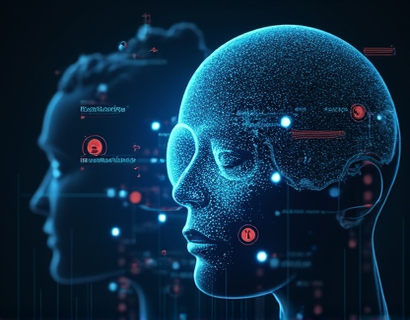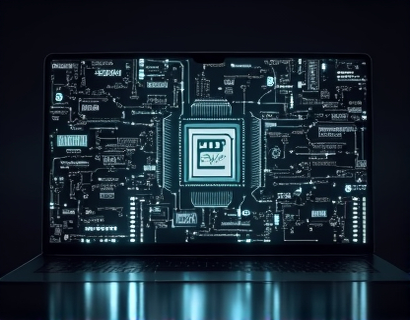AI and Crypto: Transforming Digital Engagement with Advanced Ecosystem Solutions
The intersection of artificial intelligence (AI) and cryptocurrency is reshaping the digital landscape, offering unprecedented opportunities for businesses to enhance user engagement and drive innovation. This article delves into the transformative potential of integrating AI and cryptocurrency within digital ecosystems, providing advanced strategies and AI-driven insights to help businesses stay ahead in the rapidly evolving tech environment.
Digital transformation is no longer a buzzword but a necessity for businesses aiming to remain competitive. The integration of AI and cryptocurrency into digital ecosystems represents a significant step forward in this transformation. AI brings intelligent automation, predictive analytics, and personalized experiences, while cryptocurrency offers decentralized, secure, and transparent transactions. Together, they create a powerful synergy that can revolutionize how businesses interact with their users.
Understanding AI in Digital Ecosystems
AI technologies, including machine learning, natural language processing, and computer vision, are increasingly being leveraged to create smarter, more responsive digital environments. In the context of digital ecosystems, AI can optimize various aspects of user engagement, from content recommendation systems to chatbot interactions.
One of the primary benefits of AI in digital ecosystems is its ability to analyze vast amounts of data in real-time. This capability allows businesses to gain deep insights into user behavior, preferences, and trends. For instance, AI-driven analytics can identify patterns in user interactions, enabling companies to tailor their offerings to meet specific needs and enhance user satisfaction.
Personalization is a key area where AI shines. By using machine learning algorithms, businesses can create highly personalized experiences for users. For example, content recommendation systems powered by AI can suggest articles, products, or services based on a user's past behavior and preferences. This not only improves user engagement but also increases the likelihood of conversions and customer loyalty.
Cryptocurrency and Decentralization
Cryptocurrency, on the other hand, introduces a decentralized approach to transactions and data management. Blockchain technology, the underlying infrastructure of cryptocurrencies, ensures transparency, security, and immutability. These properties are particularly valuable in digital ecosystems where trust and security are paramount.
Decentralized applications (dApps) built on blockchain platforms can offer users a more secure and transparent experience. Unlike traditional apps that rely on centralized servers, dApps distribute data and processing across a network of nodes, reducing the risk of data breaches and manipulation. This decentralized nature aligns well with the growing user demand for privacy and control over personal data.
Moreover, cryptocurrency can facilitate seamless and secure transactions within digital ecosystems. Traditional payment systems often involve intermediaries, which can lead to higher fees and slower transaction times. Cryptocurrency transactions are typically faster and more cost-effective, making them an attractive option for businesses looking to streamline their payment processes.
Synergizing AI and Cryptocurrency
The true power of AI and cryptocurrency is realized when they are combined within digital ecosystems. This synergy can lead to innovative solutions that enhance user engagement, security, and efficiency. Here are some advanced strategies businesses can adopt to leverage this combination:
- Decentralized AI Models: By deploying AI models on a blockchain, businesses can ensure that data is processed in a decentralized manner, enhancing privacy and security. This approach allows for collaborative AI training without compromising user data.
- Tokenized Rewards Systems: Implementing a token-based reward system can incentivize user participation and engagement. Users can earn tokens for completing tasks, providing feedback, or contributing to the ecosystem, which can later be redeemed for goods or services.
- Smart Contracts for Automated Processes: Smart contracts can automate various processes within digital ecosystems, such as content monetization, access control, and data sharing. This automation reduces manual intervention, increases efficiency, and ensures that agreements are executed as per the predefined rules.
- AI-Driven Security Measures: AI can enhance the security of cryptocurrency transactions and blockchain operations. Machine learning algorithms can detect and prevent fraudulent activities, such as phishing attacks and unauthorized access, by analyzing patterns and anomalies in real-time.
- Predictive Maintenance and Optimization: AI can predict system failures and optimize resource allocation within digital ecosystems. For instance, AI can forecast server load and adjust computing resources accordingly, ensuring smooth performance and minimizing downtime.
Case Studies and Real-World Applications
Several businesses have successfully integrated AI and cryptocurrency to transform their digital ecosystems. Here are a few notable examples:
One example is a gaming platform that uses blockchain to create a decentralized gaming environment. Players earn cryptocurrency tokens for completing missions and participating in events. AI algorithms analyze player behavior to personalize game content and recommend new games based on preferences. This combination has led to increased user retention and a more vibrant community.
Another instance is a content creation platform that leverages AI for content curation and monetization. Creators earn cryptocurrency tokens for producing high-quality content, which is then recommended to users based on their interests. Smart contracts ensure fair distribution of earnings, fostering a transparent and motivating environment for content creators.
In the realm of e-commerce, a retail platform has implemented a tokenized loyalty program powered by AI. Users earn tokens for purchases and engaging with the platform, which can be used for discounts and exclusive offers. AI-driven analytics help the business understand customer behavior, allowing for targeted marketing and personalized recommendations.
Challenges and Considerations
While the integration of AI and cryptocurrency offers numerous benefits, businesses must also be aware of the challenges and considerations involved:
First, the regulatory landscape for cryptocurrency is still evolving, and compliance is crucial. Businesses must stay informed about local and international regulations to avoid legal issues. Second, the technical complexity of blockchain and AI requires skilled professionals to implement and maintain these systems effectively. Investing in training and hiring experts can mitigate this challenge.
Additionally, user adoption is a key factor. Educating users about the benefits of AI and cryptocurrency and ensuring a seamless user experience are essential for successful integration. Transparency and clear communication about how data is used and protected can build trust and encourage adoption.
Future Trends and Opportunities
The future of AI and cryptocurrency in digital ecosystems looks promising, with several trends and opportunities on the horizon:
First, the rise of Web3 represents a significant shift towards decentralized internet services. Web3 leverages blockchain technology to create a more open, secure, and user-controlled web. AI will play a crucial role in enhancing the functionality and user experience of Web3 applications.
Second, the integration of AI with Internet of Things (IoT) devices within digital ecosystems can lead to smarter, more automated environments. AI can process data from IoT devices to provide real-time insights and automated responses, further enhancing user engagement and efficiency.
Third, the development of interoperable blockchain platforms will facilitate seamless interactions between different digital ecosystems. AI can help manage and optimize these interactions, ensuring smooth data exchange and process execution across diverse systems.
Finally, the growing interest in sustainable technology solutions aligns well with the principles of blockchain and AI. Decentralized systems can reduce the environmental impact of centralized data centers, while AI can optimize resource usage and minimize waste.
Conclusion
The convergence of AI and cryptocurrency is poised to revolutionize digital engagement within ecosystems, offering businesses unprecedented opportunities to innovate and grow. By embracing these technologies, companies can create smarter, more secure, and more engaging digital experiences. As the tech landscape continues to evolve, staying informed and adaptable will be key to harnessing the full potential of AI and cryptocurrency.











































